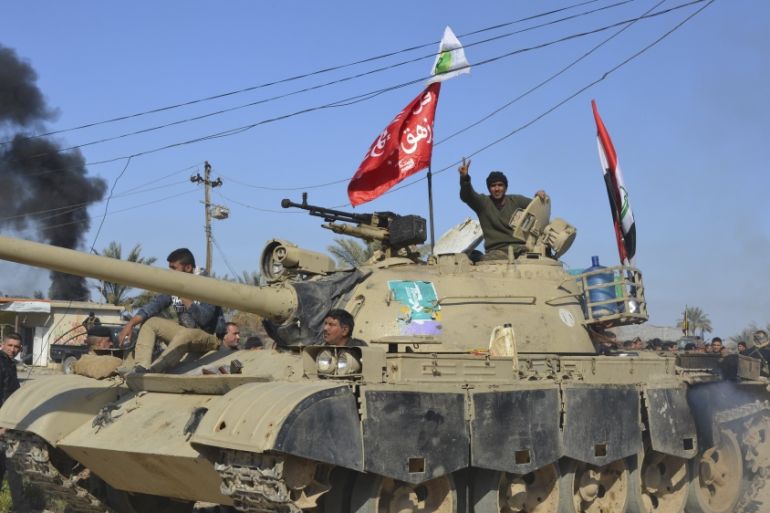Iraq’s war within a war
An apparent massacre in Diyala serves as a reminder of something more dangerous to Iraq than the fight against ISIL.

When one of Iraq’s Shia militia commanders this week declared the province of Diyala “liberated”, few people familiar with the province believed it would be a lasting victory.
In a country with a largely Shia south, Kurdish north and Sunni west, Diyala stands as a microcosm of Iraq – a mixed population of Sunnis, Shias, Kurds and Turkmen. The apparent massacre of dozens of unarmed villagers by Shia militias is a reminder of the war within a war potentially more dangerous to Iraq than the fight against ISIL.
The accounts from survivors of the massacre in Barwana are horrifying. But particularly chilling was an account from one of the survivors, a university student, that the gunmen knew their victims.
“I realised there are two types of militias,” he said. Shia militia members from the south of Iraq, he said, were there to fight ISIL. The more lethal ones were local. Empowered by their role in the Iraqi fight against ISIL, members of the Diyala militia units on Monday used it as a way to settle scores and imprint their vision of what the province should look like.
I covered Iraq’s first elections after the 2003 war from Diyala’s provincial capital Baquba and saw Sunnis, Shias and everyone else come together as Iraqi citizens to cast their votes. From an army base in Muqdadiya, near Barwana, I reported on American and Iraqi soldiers working together to rebuild the country in that brief window when it seemed possible. And I covered Diyala when al-Qaeda in Iraq moved in and declared Baquba their capital.
Those were terrible days – bodies in the streets, unbelievable levels of violence and the question of how the country could ever put itself back together again. Iraqis are an amazingly resilient people but from the north of Iraq where Yazidis are exacting revenge on the terrible things done to them to sectarian killings this week in Diyala province, the very idea of Iraq seems to be fraying.
Even the terrible effect of bombs and mortars are easier for a community to recover from than the targeted hatred of armed men who once were your neighbours.
Early in the war, when al-Qaeda first started killing Iraqi security forces, I went along with American and Iraqi soldiers as they arrested suspects at a farmhouse. At least we consider them suspects – Iraqi security forces tend not to need a trial to consider them guilty.
An Iraqi commander watched them being tied up and said “these are the ones that are blowing us up”. “Blowing us up”, he repeated, whacking a club against his hand. There was little doubt what would happen to the suspects.
Baquba and Barwana are less than a two-hour drive from Baghdad. But for years, it’s been considered risky to drive there. Even local journalists have trouble getting around. The Iraqi Human Rights Ministry says it’s too risky for it to even try to get to Barwana.
With what appears to be a massacre in driving distance, we’re left reporting the way we did at the height of Iraq’s civil war – largely by phone. Trying to piece together what happened in a corner of Iraq that seems in danger of disintegrating even with ISIL gone.